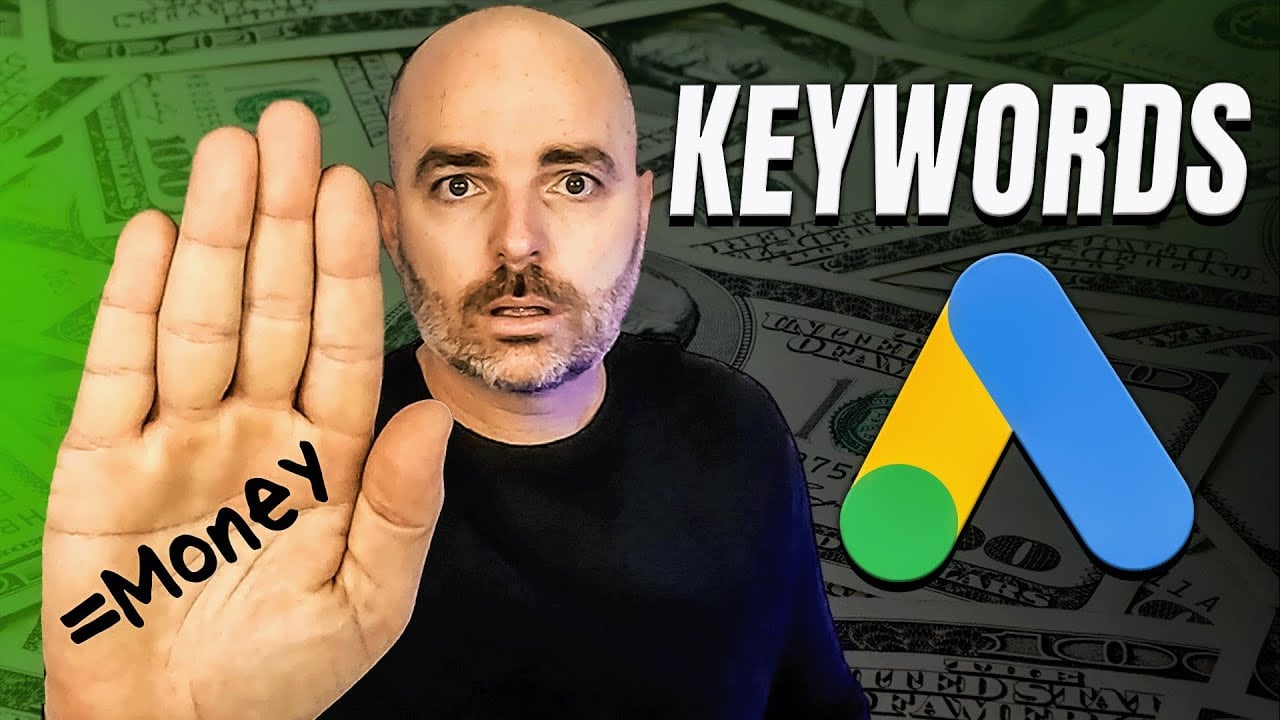- google ads search keywords
- Add And Save Desired Keywords To Advertising Plan
- Finalize And Launch Campaign
- Meetic Group’s Success With Broad Match And Smart Bidding
- Significantly Increased Conversions And Met CPA Targets
- Broad Match As A Strategic Tool For Search Activities
- Bidding Objective Determines Best Keyword Match Types
- Broad Match: Popular Choice For Smart Bidding Advertisers
- Consider Phrase Or Exact Match For Different Bidding Goals
In today’s digital landscape, where businesses strive to stand out in a sea of competitors, utilizing the power of searchadvertising has become essential. And at the heart of an effective advertising strategy lies one crucial element: keywords.
With search engines like Google processing billions of queries each day, understanding how to harness the potential of GoogleAdssearchkeywords can make all the difference in attracting the right audience and driving conversions. From crafting a targeted advertising plan to optimizing with broad match to maximize visibility, and carefully selecting match types to align with bidding goals, this guide will navigate you through the world of keyword-driven advertising success.
| Item | Details |
|---|---|
| Topic | Google Ads Search Keywords: A Guide to Successful Campaigns |
| Category | Ads |
| Key takeaway | In today's digital landscape, where businesses strive to stand out in a sea of competitors, utilizing the power of search advertising has become essential. |
| Last updated | December 28, 2025 |
google ads search keywords
Google Ads search keywords are an essential aspect of creating a successful advertising plan. By adding desired keywords to the plan and utilizing features such as broad match with Smart Bidding, advertisers can effectively capture demand in long-tail searches and increase conversions.
For example, the Meetic Group implemented broad match with Smart Bidding and experienced a remarkable 70% increase in conversions while meeting their target cost per acquisition (CPA). Broad match has proven to be a strategic tool for growing Search activities, particularly when the bidding objective aligns with this match type.
However, advertisers with different bidding goals may find success with phrase match or exact match. Overall, understanding the role of keywords in Google Ads and selecting the appropriate match type are crucial for launching a successful campaign.Key Points:
- Google Ads search keywords are important for successful advertising plans.
- Utilizing features like broad match with Smart Bidding helps capture long-tail searches and increase conversions.
- The Meetic Group’s use of broad match with Smart Bidding led to a 70% increase in conversions while meeting their target CPA.
- Different bidding goals may require different match types like phrase match or exact match.
- It’s important to understand the role of keywords in Google Ads and select the appropriate match type for a successful campaign.
Sources
https://support.google.com/google-ads/answer/6167110?hl=en
https://ads.google.com/intl/en_us/home/tools/keyword-planner/
https://blog.google/technology/ads/how-google-search-ads-work/
https://www.wordstream.com/adwords-keyword
Check this out:
? Pro Tips:
1. Experiment with different match types: While broad match is popular, don’t be afraid to try out phrase match and exact match for your Google Ads search keywords. Each match type has its own benefits and can help you reach different audiences.
2. Use negative keywords to refine your targeting: Negative keywords are essential for eliminating irrelevant search queries and ensuring your ads are shown to the right audience. Take the time to research and add negative keywords to your campaign for better results.
3. Continuously monitor and optimize your keywords: The success of your Google Ads campaign relies heavily on the performance of your keywords. Regularly review and analyze the performance of your keywords to identify opportunities for optimization and to eliminate underperforming keywords.
4. Consider using Smart Bidding strategies: Smart Bidding allows you to automate your bidding strategy and optimize for conversions, conversion value, or ROAS (return on ad spend). Experiment with different Smart Bidding strategies to find the one that works best for your campaign and keyword selection.
5. Keep up with keyword trends and search behavior: Search trends and user behavior are constantly changing, so it’s important to stay up-to-date. Regularly research and monitor keyword trends to ensure your campaign is targeting relevant keywords that align with your audience’s interests and search habits.
Add And Save Desired Keywords To Advertising Plan
When creating an advertising plan using Google Ads search keywords, the first step is to add and save the desired keywords to the plan. This ensures that the campaign targets the right audience and reaches potential customers effectively.
Here are a few key points to consider when adding and saving keywords:
Research: Conduct thorough keyword research to identify relevant and popular search terms that align with your product or service. Use tools like Google Keyword Planner to explore keyword ideas and analyze search volume.
Relevance: Choose keywords that closely match what your target audience is likely to search for. Selecting highly relevant keywords helps increase the chances of your ads appearing to the right users.
Variations: Consider adding variations of your keywords to capture a wider range of potential search queries. Include synonyms, misspellings, and related terms to broaden your reach.
Organize: Group keywords into relevant categories or themes to better manage your campaign. This makes it easier to analyze performance and adjust bids accordingly.
Save and Share: Once you’ve curated a list of desired keywords, save your advertising plan and share it with others involved in the campaign. Collaboration and feedback are crucial to optimize the effectiveness of your keyword strategy.
Finalize And Launch Campaign
After adding and saving the desired keywords to your advertising plan, it’s time to finalize and launch the campaign. This stage involves setting up various campaign parameters and ensuring everything is in place for a successful launch.
Here’s what you need to consider:
Ad Copy: Craft compelling ad copy that includes your targeted keywords. It’s important to create engaging, attention-grabbing ads that entice users to click and explore further.
Landing Pages: Ensure that the landing pages you direct users to are relevant to the keywords and ad copy. Optimized landing pages increase the chances of conversion and enhance the overall user experience.
Bidding Strategy: Determine your bidding strategy based on your campaign goals and budget. Smart Bidding, an automated bidding strategy, can help maximize results by using machine learning to optimize bids for conversions or conversion value.
Ad Extensions: Take advantage of ad extensions to provide additional information or features alongside your ads. Extensions like Sitelinks, Callouts, and Reviews can enhance the visibility of your ads and improve click-through rates.
Testing and Monitoring: Continuously test and monitor your campaign to identify areas for improvement. A/B testing different ad variations and monitoring performance metrics allows you to refine your strategy and achieve better results.
Meetic Group’s Success With Broad Match And Smart Bidding
One successful example of utilizing Google Ads search keywords is the case of Meetic Group. They used broad match with Smart Bidding to capture demand in long-tail searches, resulting in a 70% increase in conversions while meeting cost-per-acquisition (CPA) targets.
This strategy allowed them to reach a broader audience and drive more conversions. Broad match has become a strategic tool for Meetic Group in growing their Search activities.
Significantly Increased Conversions And Met CPA Targets
By leveraging broad match with Smart Bidding, Meetic Group achieved remarkable results. Their campaign resulted in a significant 70% increase in conversions, demonstrating the effectiveness of this approach.
Additionally, they were able to meet their cost-per-acquisition targets, indicating that the strategy was not only driving more conversions but also doing so in a cost-effective manner.
Broad Match As A Strategic Tool For Search Activities
Broad match has emerged as a strategic tool for growing Search activities for advertisers. This match type allows advertisers to reach a wider audience by showing ads for search terms that are variations, synonyms, or related to the specified keywords.
It enables advertisers to capture demand across a broader range of search queries, increasing the potential for conversions.
This post updated with new ad network performance data.
Bidding Objective Determines Best Keyword Match Types
The bidding objective of a campaign plays a crucial role in determining which keyword match types work best. Different match types have varying levels of specificity and can impact the reach and targeting of your ads.
Here are some key considerations:
Broad Match: As mentioned earlier, broad match is popular among advertisers using Smart Bidding. It offers a wider reach and can be effective in capturing a diverse range of search queries.
Phrase Match: This match type shows ads for search queries that include the specified keywords in the order provided, with additional words before or after. This provides a balance between reach and specificity.
Exact Match: Ads are displayed only for exact search queries that exactly match the specified keyword. This match type offers high precision but may limit reach.
Broad Match: Popular Choice For Smart Bidding Advertisers
Among advertisers using Smart Bidding, broad match has gained popularity due to its ability to capture demand in a variety of search queries. By analyzing user behavior and historical data, Smart Bidding algorithms can optimize bids for broad match keywords, resulting in improved performance and conversions.
Consider Phrase Or Exact Match For Different Bidding Goals
While broad match is a popular choice for Smart Bidding advertisers, it’s important to consider different match types based on your specific bidding goals. Advertisers who prioritize precise targeting and want to ensure their ads only appear for highly relevant search queries may opt for phrase match or exact match.
These match types provide more control over when and where your ads show up, targeting a more specific audience.
In conclusion, creating a successful advertising campaign using Google Ads search keywords requires careful planning, keyword selection, and effective bidding strategies. The use of broad match with Smart Bidding can significantly increase conversions while meeting cost-per-acquisition targets, as demonstrated by the success of Meetic Group.
However, it’s essential to consider the bidding objective and choose the most appropriate keyword match types to achieve optimal results. By following these guidelines and continuously monitoring and refining your campaign, you can maximize the effectiveness of your Google Ads search keyword campaigns.
Self-Serve DSP Platform • Programmatic Advertising • Advertising Platform for Marketers











